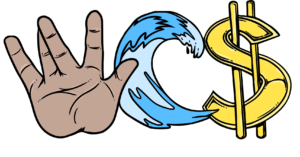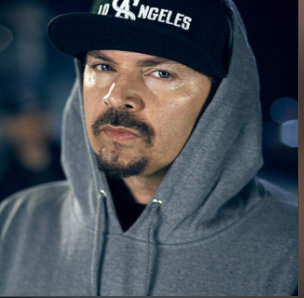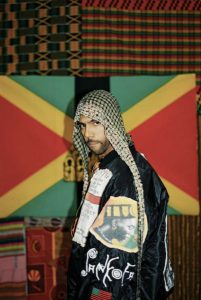DJ Muggs produced the self-titled debut album for Cypress Hill in 1991 using jazz, R&B, psychedelic rock and metal samples as the soundscape for B-Real and Sen Dog to kick their weed-fueled rhymes over. With the album released over a year before Dr. Dre came out with The Chronic, DJ Muggs and Cypress Hill had already crafted stoner anthems like “Light Another” and “Stoned Is the Way of the Walk”. While other hip-hop groups had yet to openly embrace smoking marijuana, Cypress Hill made it culturally cool to do so.
Nearly three decades later and fresh off of producing last year’s Elephants on Acid album with Cypress Hill, DJ Muggs continues to put in an incredible amount of work. Throughout the last year the iconic producer has dropped projects with Roc Marciano, Mach Hommy, Eto, Meyhem Lauren and others, while adding to a list of collaborations and credits that include U2, Depeche Mode, House Of Pain, Van Halen, Pearl Jam, and Snoop Dogg among others.
In this exclusive conversation with Chad Kiser, the ground-breaking producer and Soul Assassins founder talks about working with Cypress Hill, still being banned from Saturday Night Live for lighting a joint on live television, working with Dr. Dre on “Puppet Master”, and creating some of the classics like “How I Could Just Kill A Man” and “Hits From The Bong”.
…………………………………………………………………………………
Cypress Hill gets a lifetime ban from Saturday Night Live in 1993 after you light a marijuana joint on live television following the group’s performance. Twenty-six years later, and the climate surrounding marijuana has changed to where states are legalizing it and it’s become so mainstream. Looking back, what are your thoughts on SNL incident and the political attitude towards marijuana now in 2019?
Yeah, we got banned for life when I lit up. And I wasn’t even going to smoke, I just had the joint behind my ear. They came in my room and told me about twenty times not to do it. About the twentieth time I was like, “man, fuck them! I’m going to light this joint up”. I waited until the second song on purpose because I knew we had to do two songs. So the second time we went up, I lit it. The phones went crazy, they went crazy, and as soon as we got off stage they was yelling. Oh well, you can’t fire me, what are you going to do? They said we was banned, and I was like, “cool, I won’t come back to the show again, I don’t really care”. And now it’s funny how ironic how it’s legal all of a sudden.
Are you guys still banned from SNL?
Yeah, we’re still banned. I suspect they’ll have us up there in a few years and make a skit out of it. That’s corporate America, baby.
At the time, were you guys aware of how big your stance on the marijuana issue was or would become?
We knew the position we were taking, we talked about it a lot because we took what we were basically doing on the corner and we just went in the studio and started doing it. And at the time, Dr. Dre was talking about it and he didn’t “smoke weed or cess ‘cause it gives a brother brain damage”, and groups like the Brand Nubian were talking about how they don’t smoke weed. Everybody was talking about how they don’t smoke weed, so we came out smoking it. We were the first ones on the cover of High Times. I was a big fan of Jack Herer at the time, and we started raising money to help with reforming marijuana laws, and getting money to lobbyists so they can go to Congress and speak. We ended using Steve Blooms, who was one of the editors at High Times, to write the liner notes for us on the 20 known facts of marijuana. So, we started pushing it forward, and I think at that time it
became cool because “crack was wack”. We had become culturally cool everywhere. Once we made it cool, everybody was smoking weed, or everyone had to have a weed song all of a sudden. So, I think we did a little bit to push it forward and start the snowball effect to where it is today.
Muggs, let’s rewind a little bit and discuss some of your past work with Cypress Hill and Soul Assassins. On Soul Assassins Chapter 1 you worked with a diverse group of people like Dr. Dre, Goodie Mob, KRS-One, MC Eiht and more. “Puppet Master” was one of the stand-out cuts, with Dr. Dre and B-Real. Tell me about putting that song together and producing fellow producer and icon Dr. Dre.
The way Dr. Dre works is Dre wants a concept first and then after the concept you have to have a hook, and then Dre is ready to go. I had two concepts, one was like a guns of the west concept, and the other was a puppet master where me and Dre were the puppet masters of hip-hop because we were doing most of the biggest shit. We were controlling a lot of hip-hop, so it’s like we’re just sitting back controlling it. He said he liked that one, so B-Real wrote the hook and the verse and I took it over to Dre and he was like, “Yo, this is it!” Dre laid his verse and it pretty much flowed like a motherfucker. I told him we were going to do a video and he told me to tell him when to come down. I still go to Dre’s all the time because his studio is right down from my house. He’s a cool, humble
man who’s in the studio every day, bro. Every day he’s in the studio. He don’t sit back and party and hang out, that motherfucker’s in the gym and in the studio, just like we are.
The debut project from Cypress Hill, in 1991. Talk to me about that first Cypress Hill album and how that record came about.
That first record was everything we had went through, what we were going through, how we were living. It’s all documented on that first record. It was about 3 years of demos until it came to that point.
My favorite joint from that project was “How I Could Just Kill a Man”. What was your process in putting together the samples of Jimi Hendricks, the drums from Manzel’s “Midnight Theme”, and Lowell Fulson’s “Tramp?”
Man, a lot of fucking weed! I was inspired by The Bomb Squad, Ultramagnetic, EPMD, Run-DMC and the way they would just layer music. I would layer a lot of music. It was a little difficult because all I had was the SP-1200 and the Tascam 4-track, so I spent a lot of time locking things up and just layering them and layering them. Trial and error. That song was originally called “Trigga Happy Nigga”, but there was one line in the song, in the middle of the verse, actually, where B-Real goes, “Here is something you can’t understand, how I could just kill a man”. And I was like, “Yo, that’s the fucking hook right there!” They looked at me like I was crazy, but that was the fucking hook. We mixed it down on the little 4-track and put it on cassette, and we drove around listening to it over and
over and over and over. It was like, ‘this shit was banging right here’. That was one of our five demos, we had that, “Phuncky Feel One”, “Light Another”, “Real Estate” and those were our demo tape.
On Black Sunday, talk to me about putting together “Hits from the Bong”, and building the samples from Dusty Springfield’s “Son of a Preacher Man”, and Lee Dorsey’s “Get Out My Life, Woman”.
Yeah, I didn’t really think about I was going to go get this Dusty Springfield record and this Lee Dorsey record. Those were the records that were just there, that just kind of fit together. Me and B-Real was just sitting there talking, smoking a bong, and we just started talking about writing a song about bong. Everything that happens when smoking a bong, all the things that happen and all the experiences. The thing about Black Sunday, like I said it took us 3 years to do the first album, then we went on tour for two years non-stop. We weren’t getting any radio play or nothing, so we had to go on tour to get in front of people. We played in front of twelve people! So, when it was time to do the second record, they go, “we need that shit quick!” So, we did the record in about six weeks. We did it in New York in my apartment, went in the studio and banged the record out in six weeks. I think
we only recorded like eight new songs because “Hand on the Glock” was on a B-side and “A to the K” was on the White Men Can’t Jump” soundtrack, so we only recorded eight or nine new songs. It was real dense record because there wasn’t a lot of time to do a lot of layering or anything. I didn’t make any beats for those two years because I was on tour, and all the beats I did make I gave to Ice Cube, or House of Pain. I had to go in with no beats and just made all the beats real quick.
Where did you guys come up with the album cover artwork?
The album cover was inspired by Ministry, an industrial rock band. I was listening to them a lot, Al Jourgensen, and Nine Inch Nails, and all of that. That’s what the album cover was inspired by.
Elephants on Acid is Cypress Hill’s latest group release. I love this record! “Band of Gypsies” is crazy. Tell me about putting that record together because and working with fellow producer Fredwreck on the project. The sessions must have insane!
I had the beat done. Fred was like, “yo, I got these Egyptian kids. You should put some of these Arab sounds in there, that would be ill”. He got in touch with the kids in Egypt because he knew them from when he lived out in Dubai for three years. So, we went flew out to Egypt and stayed out there for three weeks. I recorded with the kids, they did this style called Mahragan that they put out after the revolution in Egypt, the new ghetto music. Fred co-mixed most of the album, played keyboards on a few tracks, some bass lines on a few tracks, and mixed the record with me. We’re really good friends and we work together all of the time. The experience of going to Egypt and going into the pyramids, going to the King’s chambers, going to Jordan, going to Petra, man it was a real spiritual experience.
Following the Elephants on Acid release with Cypress Hill, it’s like you’ve been nonstop over the past year collaborating with Meyhem Lauren, Eto, Mach Hommy and others.
Bro, music is so easy that it’s boring. I just have to connect with the right human beings because most human beings are wack. But when I meet good humans I keep them close, I have a good time, and you see the outcome. At the same time I don’t act like I know everything because I’m student, so I keep learning about music and studying it. I keep challenging myself by staying outside of my comfort zone. I’m blessed to go to Alchemist, to go Evidence’s house, and they’re constantly working to keep me motivated like the old saying sword sharpens sword. My friends are like the masters of this stuff. I’ve got constant inspiration around me twenty-four seven. I live a blessed life man.


